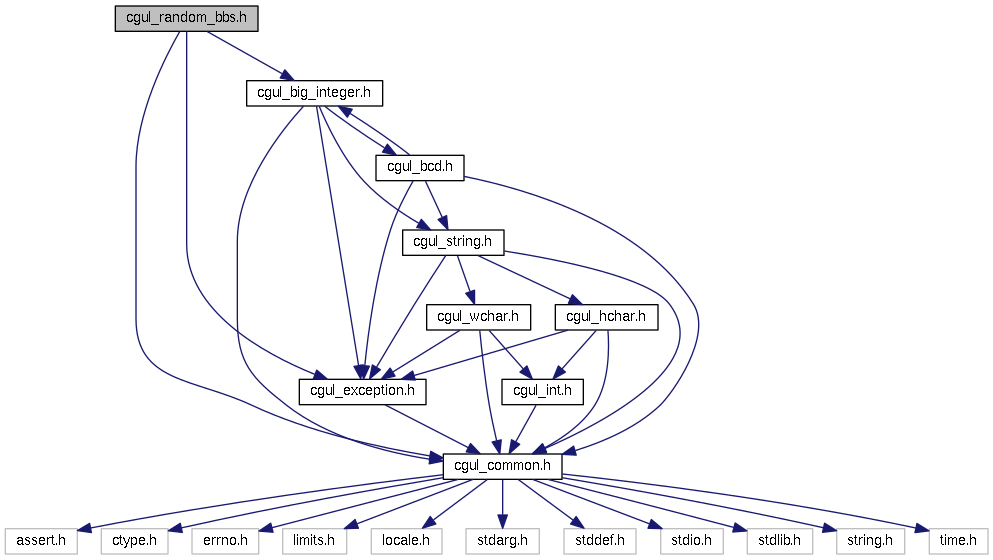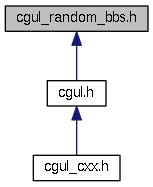PRNG (Blum-Blum-Shub) More...


Typedefs | |
| typedef typedefCGUL_BEGIN_C struct cgul_random_bbs * | cgul_random_bbs_t |
Functions | |
| CGUL_EXPORT cgul_random_bbs_t | cgul_random_bbs__new (cgul_exception_t *cex) |
| CGUL_EXPORT cgul_random_bbs_t | cgul_random_bbs__new_from_seed (cgul_exception_t *cex, cgul_big_integer_t seed) |
| CGUL_EXPORT void | cgul_random_bbs__delete (cgul_random_bbs_t r) |
| CGUL_EXPORT void | cgul_random_bbs__next (cgul_exception_t *cex, cgul_random_bbs_t r, cgul_big_integer_t next) |
| CGUL_EXPORT void | cgul_random_bbs__next_in_range (cgul_exception_t *cex, cgul_random_bbs_t r, cgul_big_integer_t next, cgul_big_integer_t range_max) |
Detailed Description
Blum-Blum-Shub (BBS) pseudo-random number generator. This class has not been audited for security or cryptography purposes. It should only be used for general statistical purposes. Because the BBS PRNG only generates one bit per iteration, it is the slowest of the PRNGs in cgul. On the other hand, a correctly coded BBS PRNG has the best theoretical guarantee for generating random numbers.
Typedef Documentation
§ cgul_random_bbs_t
| typedef typedefCGUL_BEGIN_C struct cgul_random_bbs* cgul_random_bbs_t |
Opaque pointer to a cgul_random_bbs instance.
Function Documentation
§ cgul_random_bbs__new()
| CGUL_EXPORT cgul_random_bbs_t cgul_random_bbs__new | ( | cgul_exception_t * | cex | ) |
Create a new cgul_random_bbs object seeding it with the value returned by time(), i.e., the 32-bit seconds since the epoch. The caller is responsible for freeing the object by calling cgul_random_bbs__delete(). If memory cannot be allocated, NULL is returned, and an exception is thrown.
- Parameters
-
[in,out] cex c-style exception
- Returns
- new
cgul_random_bbsinstance
§ cgul_random_bbs__new_from_seed()
| CGUL_EXPORT cgul_random_bbs_t cgul_random_bbs__new_from_seed | ( | cgul_exception_t * | cex, |
| cgul_big_integer_t | seed | ||
| ) |
Create a new cgul_random_bbs object seeding it with the value the user passes in seed. The caller is responsible for freeing the object by calling cgul_random_bbs__delete(). If memory cannot be allocated, NULL is returned, and an exception is thrown.
- Parameters
-
[in,out] cex c-style exception [in] seed seed value
- Returns
- new
cgul_random_bbsinstance
§ cgul_random_bbs__delete()
| CGUL_EXPORT void cgul_random_bbs__delete | ( | cgul_random_bbs_t | r | ) |
This method frees all internally allocated memory. Do not attempt to dereference r after calling this method.
- Parameters
-
[in] r cgul_random_bbsinstance
§ cgul_random_bbs__next()
| CGUL_EXPORT void cgul_random_bbs__next | ( | cgul_exception_t * | cex, |
| cgul_random_bbs_t | r, | ||
| cgul_big_integer_t | next | ||
| ) |
The next element in the random number sequence is returned in next. Because Blum-Blum-Shub is a bit generator, the random numbers returned are only 1-bit wide. It is possible to generate larger random numbers by calling cgul_random_bbs__next_in_range() which will assemble the larger numbers from multiple iterations of the generator.
- Parameters
-
[in] cex c-style exception [in] r cgul_random_bbsinstance[out] next next element in the random number sequence
- See also
- cgul_random_bbs__next_in_range()
§ cgul_random_bbs__next_in_range()
| CGUL_EXPORT void cgul_random_bbs__next_in_range | ( | cgul_exception_t * | cex, |
| cgul_random_bbs_t | r, | ||
| cgul_big_integer_t | next, | ||
| cgul_big_integer_t | range_max | ||
| ) |
If the value returned by cgul_random_bbs__next() is not the exact range that is needed, this method can limit or extend the return value to [0, range_max). If range_max is larger than the number of bits that can be generated in one iteration, multiple iterations will be used.
- Parameters
-
[in] cex c-style exception [in] r cgul_random_bbsinstance[out] next next element in the random number sequence [in] range_max exclusive limit on the maximum value returned
